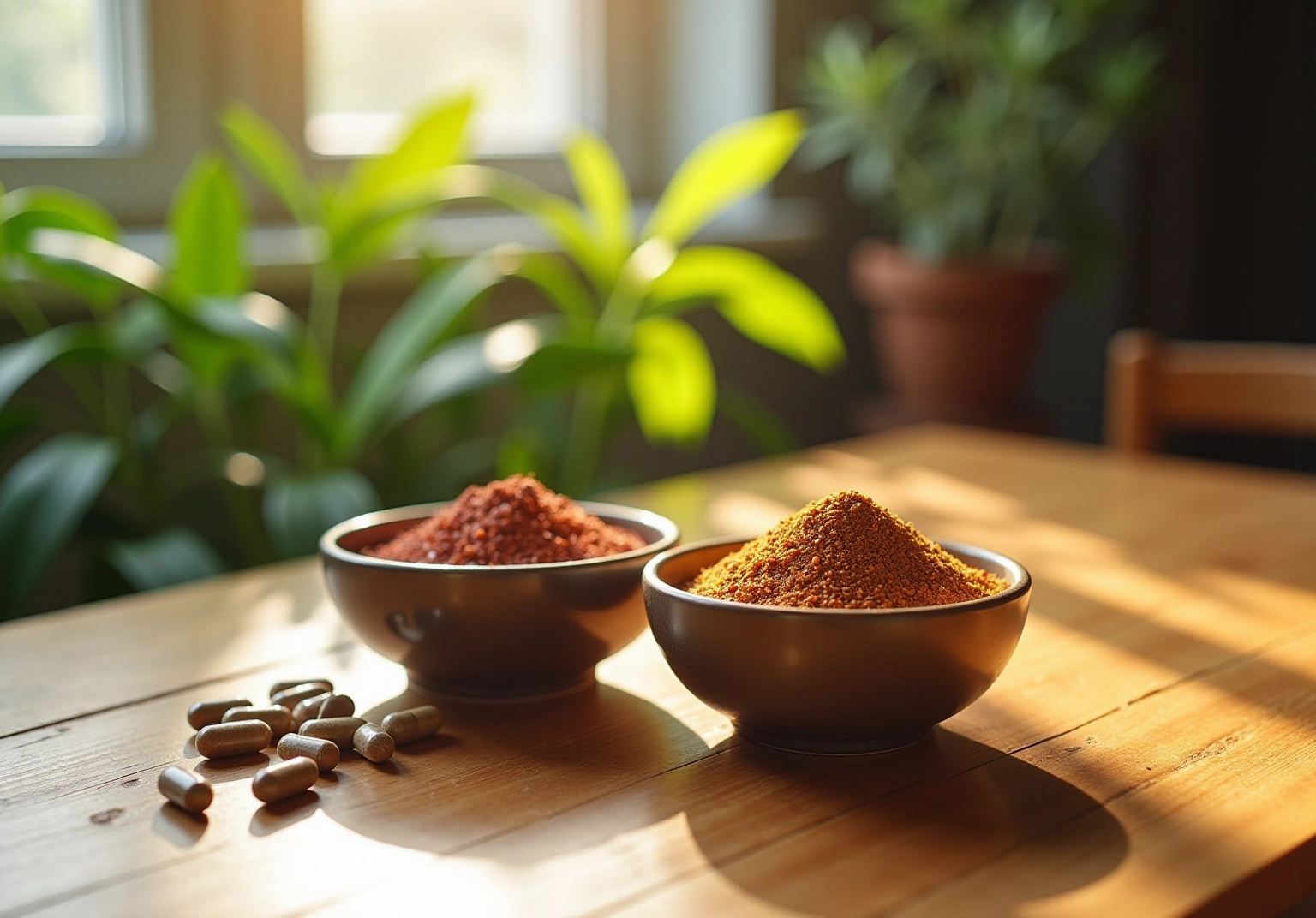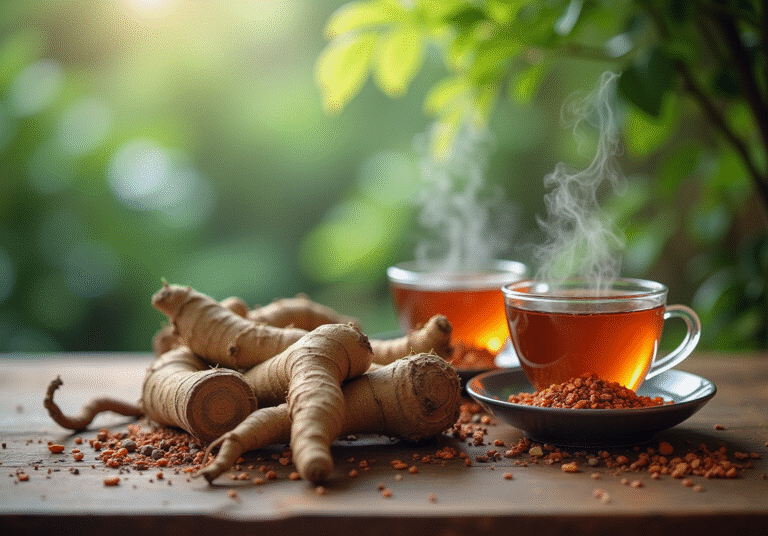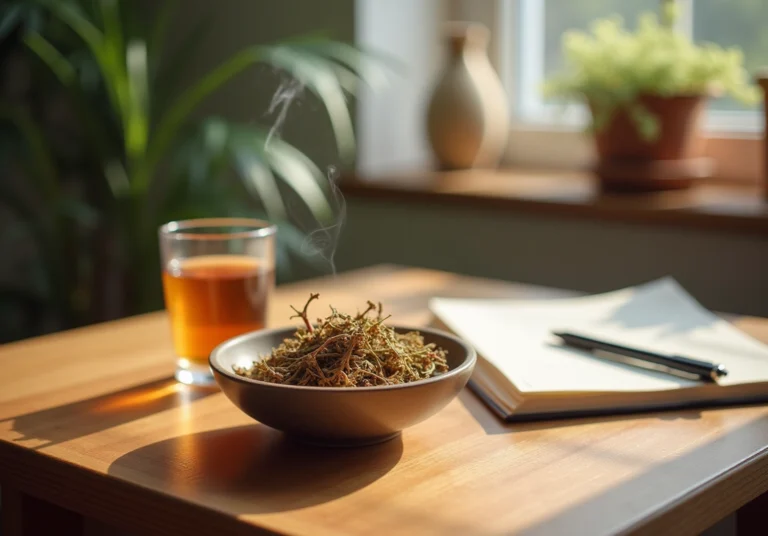Combine Ashwagandha and Rhodiola Together for Optimal Benefits
Overview
Combining ashwagandha and rhodiola can lead to optimal benefits for stress management and overall vitality. Ashwagandha is known for its ability to reduce stress, while rhodiola enhances energy and cognitive function. Furthermore, the soothing properties of ashwagandha complement the invigorating effects of rhodiola, creating a synergistic effect. Many users find this combination beneficial for their well-being, making it a compelling option to explore for those seeking to improve their vitality.
Introduction
The rising interest in natural remedies has prompted many to explore the remarkable benefits of adaptogenic herbs, particularly Ashwagandha and Rhodiola. These two plants are widely recognized for their capabilities in helping the body manage stress and enhance overall well-being. However, their full potential may be realized when they are combined.
This article investigates the best ways to harness the synergistic effects of Ashwagandha and Rhodiola, providing insights into their individual benefits, safety considerations, and practical guidelines for effective use.
But can this combination truly deliver the best of both worlds? Are there hidden challenges that users should consider?
Understand Ashwagandha and Rhodiola: Key Benefits and Properties
Withania somnifera, commonly known as Ashwagandha, and another adaptogenic herb are both celebrated for their capacity to assist the body in managing stress.
Key Benefits of Ashwagandha:
- Stress Reduction: Ashwagandha is known for its ability to lower cortisol levels, which helps reduce stress and anxiety.
- Improved Sleep Quality: It promotes better sleep by calming the nervous system.
- Enhanced Cognitive Function: Regular use may improve memory and cognitive performance.
Key Benefits of Rhodiola:
- Increased Energy and Stamina: Rhodiola is often used to combat fatigue and enhance physical performance.
- Mood Enhancement: It can help alleviate symptoms of depression and anxiety.
- Cognitive Support: This herb may enhance focus and mental clarity, particularly in stressful circumstances.
The synergistic outcome can be achieved by merging ashwagandha and rhodiola together. The combination of ashwagandha and rhodiola together balances the soothing qualities of ashwagandha with the invigorating benefits of rhodiola, making them a potent pair for stress management and overall vitality. Consider exploring these adaptogens further to enhance your well-being.
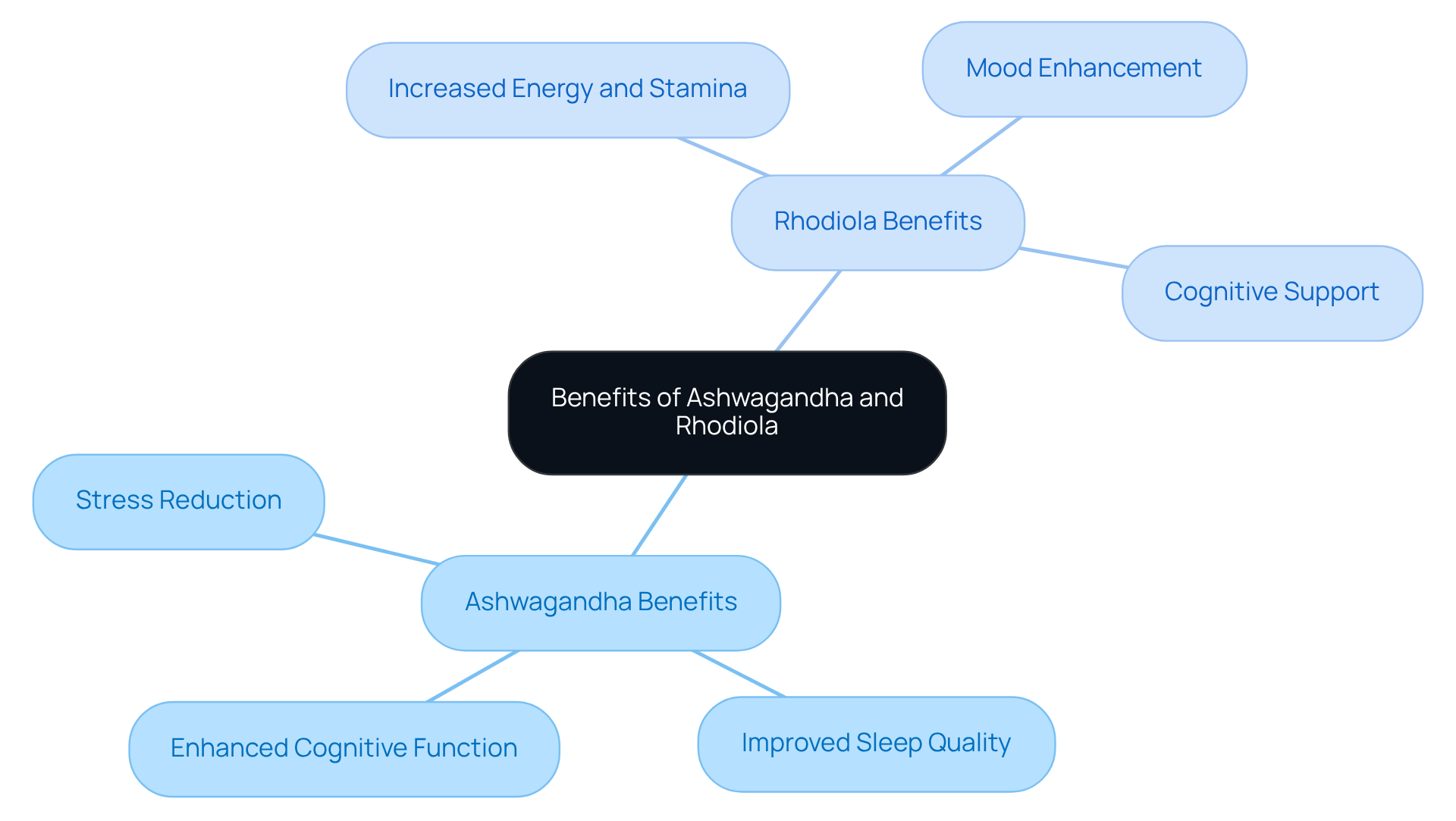
Assess Safety: Can You Combine Ashwagandha and Rhodiola?
Mixing this adaptogen with another is generally regarded as safe for most individuals. However, it is essential to assess personal health conditions and consult a healthcare professional, especially if you belong to any of the following categories:
- Pregnant or Nursing: The effects of both herbs during pregnancy and lactation are not well-studied, necessitating caution.
- Taking Medications: The herb may interact with sedatives and medications that lower blood pressure, while another could influence blood sugar levels.
- Experiencing Reactions: If you have previously encountered adverse reactions from either plant, combining them might increase these responses.
Moreover, it is important to note that this herbal supplement has been associated with significant adverse reactions, including liver issues. Additionally, both plants may induce minor reactions, such as dizziness from one and sedation from the other. Furthermore, Denmark’s recent ban on this herb due to safety concerns underscores the need for caution when using it.
Overall, many individuals report that the combination of ashwagandha and rhodiola together enhances their well-being without notable negative effects. Nonetheless, it is crucial to monitor your body’s response when starting any new supplement regimen, ensuring a personalized approach to your health journey.
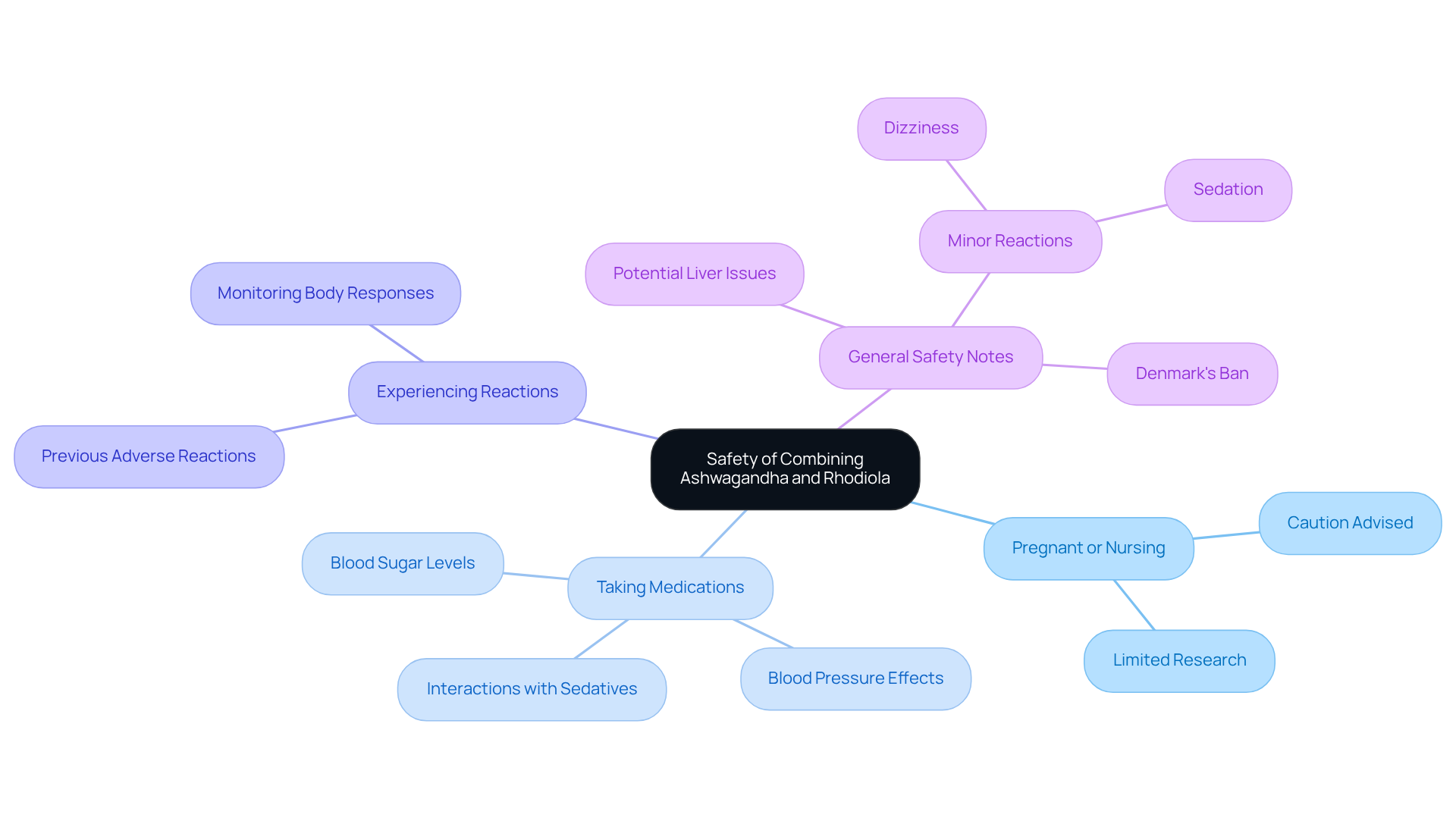
Combine Effectively: Dosage and Timing for Optimal Results
To effectively combine ashwagandha and rhodiola together, it is essential to follow specific dosage and timing guidelines that maximize their benefits.
Dosage:
- Ashwagandha: 300-600 mg per day, standardized to contain at least 5% withanolides.
- Rhodiola rosea: 200-600 mg daily, typically standardized to include 3% rosavins and 1% salidroside.
Timing:
- Morning: Taking Rhodiola in the morning helps harness its energizing effects throughout the day, enhancing focus and stamina.
- Evening: Conversely, Ashwagandha is best taken in the evening to promote relaxation and improve sleep quality, making it an ideal choice for unwinding after a hectic day.
It is crucial to note that both Ashwagandha and Rhodiola may interact with certain medications. Therefore, consulting a healthcare professional before starting any new supplement regimen is highly recommended. Personal health conditions can also influence how these plants operate, making tailored guidance advantageous.
For added convenience and balanced dosing, consider using a combined supplement that includes ashwagandha and rhodiola together, ensuring you receive the optimal benefits from each. Furthermore, be mindful of possible side reactions such as stomach discomfort or dizziness, which can arise with these supplements. By following these guidelines, you can effectively incorporate Ashwagandha and Rhodiola into your wellness routine.
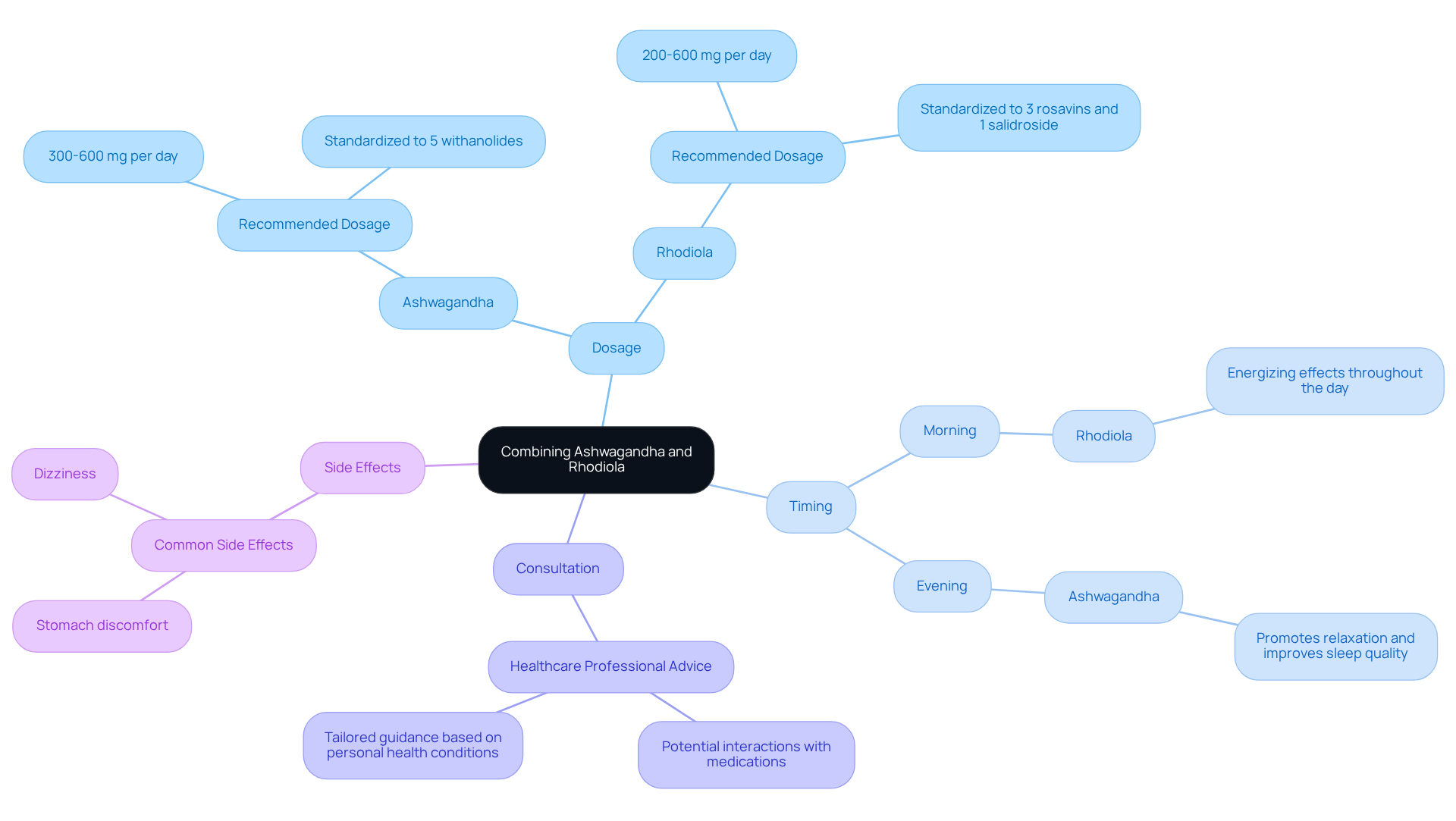
Troubleshoot: Address Common Concerns and Side Effects
While these herbs are generally considered safe, some individuals may encounter adverse reactions. Let’s explore common concerns and strategies to address them:
- Drowsiness: Ashwagandha can induce drowsiness in some users. To mitigate this, consider taking it in the evening or reducing the dosage. Monitoring your response can help you find the right timing and amount. Health professionals note that drowsiness is a common side effect, particularly when starting the supplement.
- Digestive Issues: Mild gastrointestinal discomfort, such as nausea or diarrhea, may occur with both herbs. Taking them with food can alleviate these symptoms and enhance absorption. Studies indicate that approximately 10-20% of users report mild digestive issues when beginning these supplements.
- Headaches or Dizziness: Rhodiola may lead to headaches or dizziness in certain individuals. If you experience these effects, it is advisable to reduce the dosage or consult a healthcare professional. Experts suggest that these symptoms can often be managed by adjusting the dosage.
- Mood Changes: Monitoring your mood when starting these herbs is crucial, as they can affect individuals differently. If you notice increased irritability or anxiety, discontinue use and seek guidance from a healthcare provider. Notably, combining this herb with medications such as thyroid hormone tablets may exacerbate mood fluctuations, necessitating careful observation.
By being aware of these potential adverse reactions and implementing these strategies, you can maximize the benefits of Ashwagandha and Rhodiola while minimizing discomfort. Additionally, real-life experiences shared by users indicate that gradual dosage adjustments can lead to better tolerance and fewer side effects.
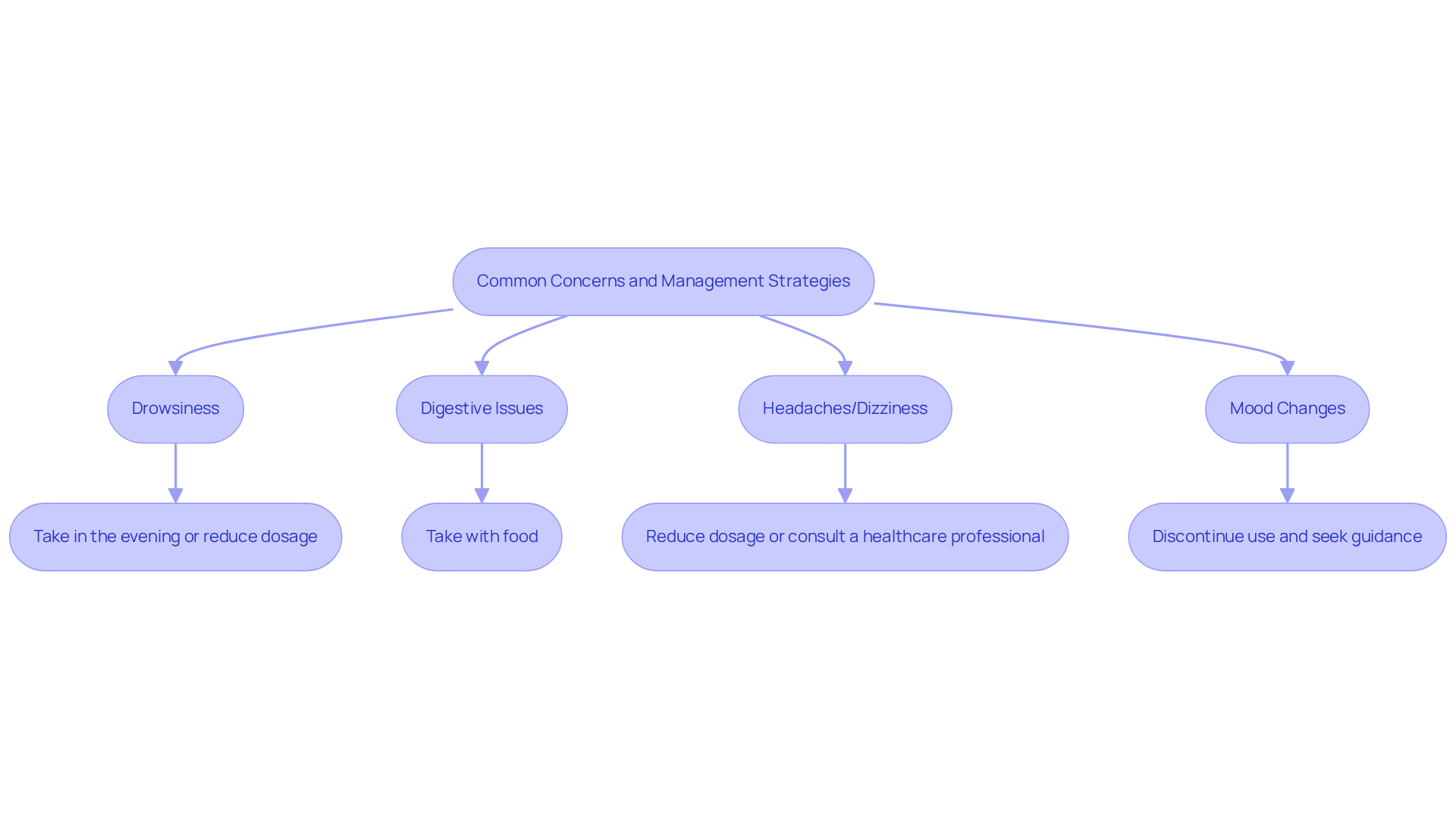
Conclusion
Combining ashwagandha and rhodiola offers a compelling strategy for enhancing overall well-being and managing stress. This powerful duo leverages the calming effects of ashwagandha alongside the energizing properties of rhodiola, establishing a balanced support system for both mental and physical health.
Key benefits of each herb are highlighted throughout the article:
- Ashwagandha plays a significant role in reducing stress and improving sleep quality.
- Rhodiola is known for its ability to boost energy and enhance mood.
Additionally, safety considerations, optimal dosages, and timing for consumption are discussed, emphasizing the importance of a tailored approach based on individual health needs and potential interactions with medications.
Ultimately, the combination of ashwagandha and rhodiola can serve as a valuable addition to a wellness routine. It promotes resilience against stress and enhances vitality. Understanding how to effectively incorporate these adaptogens can lead to significant improvements in health and quality of life. Embracing this natural synergy not only empowers individuals to manage stress more effectively but also inspires a holistic approach to health that prioritizes both mind and body.
Frequently Asked Questions
What is Ashwagandha and what are its key benefits?
Ashwagandha, scientifically known as Withania somnifera, is an adaptogenic herb celebrated for its ability to assist the body in managing stress. Key benefits include stress reduction by lowering cortisol levels, improved sleep quality by calming the nervous system, and enhanced cognitive function, potentially improving memory and cognitive performance.
What are the key benefits of Rhodiola?
Rhodiola is another adaptogenic herb known for increasing energy and stamina, combating fatigue, enhancing physical performance, mood enhancement by alleviating symptoms of depression and anxiety, and cognitive support by improving focus and mental clarity, especially in stressful situations.
How do Ashwagandha and Rhodiola work together?
The combination of ashwagandha and rhodiola creates a synergistic effect, balancing the calming qualities of ashwagandha with the invigorating benefits of rhodiola. Together, they form a potent pair for effective stress management and overall vitality.
Why are adaptogens like Ashwagandha and Rhodiola important for well-being?
Adaptogens like Ashwagandha and Rhodiola are important because they help the body manage stress, enhance physical and mental performance, improve mood, and promote better sleep, contributing to overall well-being and vitality.
